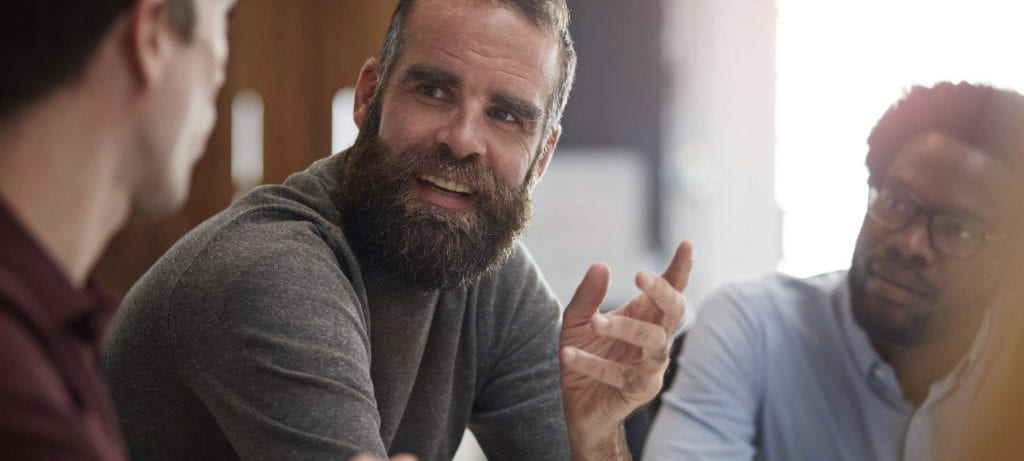
Divorce is a challenging time in a person’s life. Anyone who has been through a divorce can offer many reasons as to why divorce is painful and hard, especially if there are children involved. Your world is turned upside down, and it can be hard to return to reality and feel normal again.
The problems and emotions that arise in divorces are far and wide. You may:
While these feelings and experiences aren’t happy, it’s important to move on when it’s time. Plugging into your community, creating a strong sense of support, and setting time aside to grieve and heal can make all the difference.
Divorce affects all parts of your life. “I see a tendency to want to shut down in terms of connections to other people and taking care of themselves,” program director at Center on Fathering, Ken Sanders said. When you overlook many aspects of your life and only focus on one there is usually a negative impact, and he believes in balance.
Sanders tells his clients about the importance of eating well, exercising, staying in contact with friends and families, and using other supportive processes to heal. However, it’s also important to listen to your body and know when you are overexerting or pushing yourself too far.
There are many strategies you can use to cope with your divorce. Below are some common behaviors and resources.
Separating from your spouse is likely to cause emotional and mental stress. However, it’s important to know that it’s okay for you to feel the way you do, and it’s normal to grieve the conclusion of a relationship that once meant so much to you.
In the beginning, don’t be too hard on yourself and take the time to heal. The only person who knows what your body and mind need is you.
Shannon Harrison, a therapist, explains how no one plans to get a divorce, and you have no idea how it will affect you. “Be incredibly gentle with yourself,” she said. “If you feel like taking a nap, take a nap, or if you feel like going for a walk, then go for a walk.”
She went on to explain how people quickly will make themselves feel wrong for not sticking with their healthy eating, or exercise plan, and that they shouldn’t be so hard on themselves.
“If you want a cheeseburger and a glass of wine every once in a while, that’s okay. This is a place you haven’t ever been to. You should give yourself a lot of space and listen to your body.”
Talking about your feelings in a safe place can keep you from internalizing pain. Speaking with a friend, family member, or a therapist is part of the healing process and can help you cope with the end of your relationship. When you hold in your feelings and isolate yourself from those you love, you can increase your stress levels, making it harder to concentrate, and allow your divorce to get in the way of your life at work and home.
Sanders mentions how helpful it is to have at least one person you trust and can talk with if you are initially uncomfortable in a group setting, whether that’s someone you know personally or a licensed therapist that you seek out. “Out of that experience, hopefully, you can begin to see how a group process would be beneficial to your healing.”
Feeling like you are a part of something can drastically improve your mental health. If you’ve always wanted to try a certain hobby, now is the time to do it! Throw yourself into something, discover new things about yourself, or revisit passions you’ve forgotten. Take a free class at your local community center or university, join a sports league or volunteer. Find a place where you can truly feel like yourself and can think about something other than your divorce.
If you are feeling lost, remember you aren’t alone in going through your divorce. Draw upon and band together with others who have experienced or are currently going through a divorce and understand what you’re feeling. Create an open, honest community where you can voice your feelings, but also listen to the problems others are facing. This open conversation is key for you to realize and remember that you aren’t in this alone.

It’s common for those going through troubled times to have chest pains, stomach aches, and other pains. Your body can sense when you aren’t mentally healthy. Physical pain and tiredness are often the results. The same areas of the brain that is activated when you feel physical pain is also activated when you feel emotional pain. Strive to be healthy mentally and physically.
Physical exercise can be beneficial to release endorphins and fight stress. Consider joining a gym or taking daily walks. Find some type of movement that you enjoy. A good habit is trying to set aside 20-30 minutes each day to be active, whether it’s lifting weights, playing a sport, running, riding a bike, or yoga.
Physical health isn’t just about being active, it’s also about maintaining a healthy diet. Making the effort to cook and buy healthy foods may seem like an inconvenience when dealing with your divorce, but it has a profound impact on your overall health. Try to eat three meals a day, drink plenty of water, and reach for brain-boosting foods such as leafy greens, whole grains, and fruit, over salty snacks and sugary sweets. Trust us, your body and your mind will thank you.
If you believe in a higher power, spending more time in prayer can be refreshing when going through a divorce. Make it a priority to go to a place of worship and connect with people who can uplift you. If organized religion isn’t for you, make it a point to tap into your spirituality by setting aside time to meditate. Even taking time to do something that helps you free your mind of stress and worry, whether it’s writing in a journal or reading a book, can help you reconnect with your spiritual side.
Most churches have small groups that can be a great support system. Expressing your feelings to others who are unbiased can be a great way to get guidance if desired. Your family members and your closest friends are only trying to be supportive, but sometimes they’re too forthcoming in terms of what they think you should do.
There are also financial situations to consider when going through a divorce. If you weren’t working or adapted to a double income, learn how to operate on a single income. Take the time to assess your spending habits and know where you can pull back. There are plenty of budgeting apps to teach you new ways to budget and handle your money.
Looking back on your relationship and recognizing that it was unhealthy and it didn’t serve you well can put your emotions at ease. Without anger, try to consider the more difficult times and how a divorce can be freeing and the right thing for both of you.
Maybe you’ve found hope in being yourself and having the freedom to be happy in life. Maybe your divorce is better for your children than being in a hostile environment with unhappy parents. One day, you might even find a new partner who is invested in being in a happy and mutually beneficial relationship.
Rather than holding on to the past with grudges against your former spouse, look at your divorce as an opportunity to live for yourself and look forward to your future.
It’s a good idea to start socializing with people. You might have to fake a smile in the beginning, but after some time, your fun spirit will come back and you’ll make new friendships that will help you through the dark days and make the happier days even better.
After your divorce, it’s normal to feel like you’re on a roller coaster ride of emotions. From sadness, grief, and rejection, to anxiety, guilt, and betrayal, there’s no doubt divorce can leave you feeling lost and confused. That’s where a divorce support group filled with individuals riding that exact same roller coaster can be beneficial.
A support group can validate your emotions and help you realize there are others going through the exact same situation as you are. Not only can your support group aid in normalizing your feelings, but they can be a powerful resource to get through the complexities that come with divorce.
There are many online forums that offer complete anonymity. These forums are a great opportunity to share feelings, but understand these people are all in different stages of their divorce and some may be more negative than others.
Do your research and find a support group that fits your needs and interests. Want to meet with a diverse group, or just men or women? How about a group designed for newly single parents? There is sure to be a support group for you. Below are some divorce support group options in the Denver and Colorado Springs area to consider.
Divorce Support Meetups (Denver, CO)
Divorce Support Groups (Denver, CO)
Divorce Support Groups (Colorado Springs, CO)
DivorceCare Support Groups (Colorado Springs, CO)
DivorceCare Support Groups (Denver, CO)
If you are a private person and struggle to share with strangers, community groups may not be the ideal support system. One alternative to attending an organized support group is to develop your own personal support group with people you are comfortable confiding in.
Consider your friends, family, and people in your life who could make a good support group. The following are qualities to look for in potential support group members:
Good listeners: Surround yourself with those willing to listen, not share their own advice. At this point, having a good listener can be very therapeutic.
Calming spirit: Who has a calming effect on you? The energy they put off should calm you and make you feel more relaxed.
Committed: Find people who are committed to being there for you throughout the entire copping process. You don’t want individuals who will listen to you once and then disappear.
Positivity: Rather than focusing on the negative aspects of your divorce, find someone who can lift you up and focus on the positives.
Activate your support group when you need to talk to someone about your feelings and emotions, don’t lean on your lawyer. While many truly want to help (we do!), a lawyer’s time comes at a cost. You should lean on your lawyer when you need legal advice, recommendations for splitting parental responsibility, and finalizing the terms of your divorce. Strategically think about what advice you need from your lawyer and what advice you can get from your support group.
Our goal is to get you through a divorce as pain-free as possible. Our divorce attorneys at Modern Family Law are here to provide the legal guidance you need during this difficult time. Contact us today for a free consultation and discuss your case with one of our experienced family law lawyers.

Collaborative
How Does Collaborative Divorce Work?Divorce doesn’t always have to be a battleground. While many people associate divorce with courtrooms, conflict, and emotional turmoil, a growing movement is emerging…

Collaborative
Is Collaborative Divorce Right For You?Divorce is a significant life event that brings about emotional, financial, and legal changes. For many, the traditional route of litigation can seem daunting,…

Divorce
Collaborative Divorce In WashingtonMany couples seek ways to avoid the adversarial nature of traditional courtroom proceedings when facing divorce. Collaborative divorce offers an alternative approach emphasizing cooperation,…